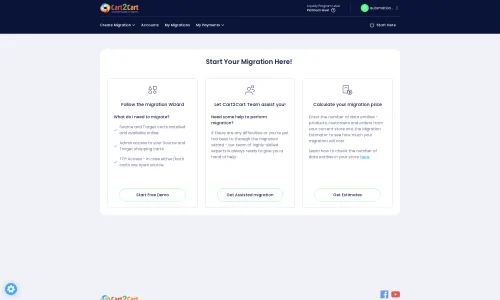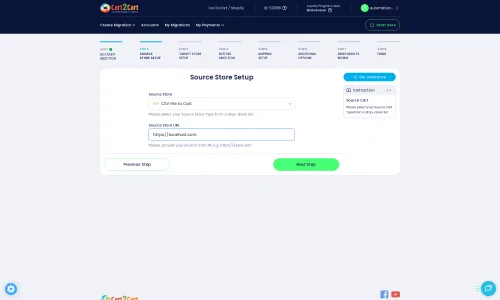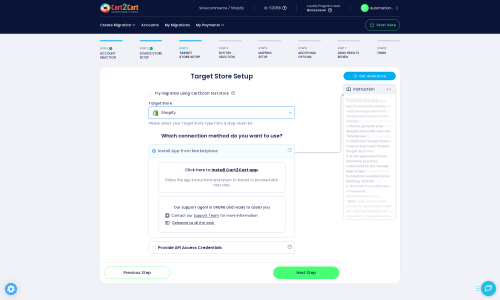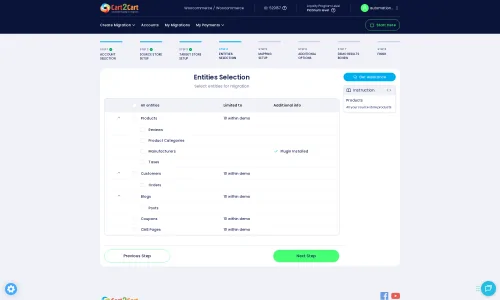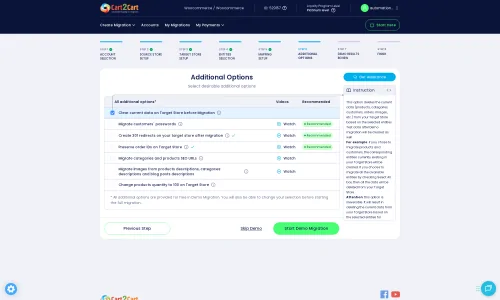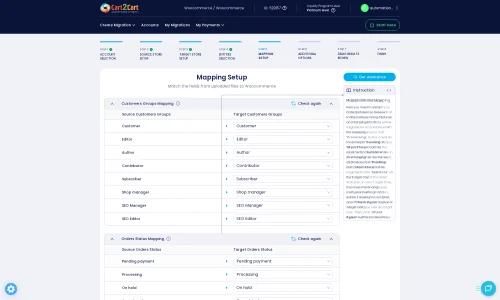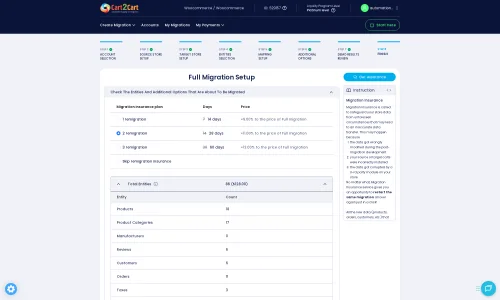Merchium to Shopify Migration - Step-by-Step Guide & Expert Services
Merchium to Shopify migration is simple with Cart2Cart. Ready to move Merchium store to Shopify effortlessly? Our service ensures a swift, secure, and seamless switch from Merchium to Shopify, preserving your SEO and guaranteeing zero downtime. We accurately transfer data, protecting your valuable information. Whether you seek a comprehensive step-by-step guide for DIY users or require expert assistance for a completely done-for-you Merchium to Shopify migration, we provide the perfect solution to elevate your online store.
What data can be
migrated from Merchium to Shopify
-
Products
-
Product Categories
-
Manufacturers
-
Customers
-
Orders
-
Coupons
-
Reviews
-
Multiple Languages
Estimate your Migration Cost
To calculate your Merchium to Shopify migration price, click the button below. The migration price may vary depending on the number of data types and the additional migration options selected.
How to Migrate from Merchium to Shopify In 3 Steps?
Connect your Source & Target carts
Choose Merchium and Shopify from the drop-down lists & provide the stores’ URLs in the corresponding fields.
Select the data to migrate & extra options
Choose the data you want to migrate to Shopify and extra options to customise your Merchium to Shopify migration.
Launch your Demo/Full migration
Run a free Demo to see how the Cart2Cart service works, and when happy - launch Full migration.
Migrate Merchium to Shopify: Your Definitive Guide for a Seamless Transition
A Comprehensive Guide to Transitioning from Merchium to Shopify
Replatforming your e-commerce store is a strategic move that can significantly impact your business's future growth and operational efficiency. If you're currently operating on Merchium and looking to harness the robust features, vast app ecosystem, and scalability of Shopify, this guide is designed for you. This article provides a clear, step-by-step walkthrough for migrating your valuable store data – including products, customer information, orders, and more – from Merchium to Shopify, ensuring a smooth and successful transition. We’ll leverage an automated migration process to safeguard data integrity and minimize downtime, allowing you to focus on leveraging Shopify's powerful capabilities.
Prerequisites for a Smooth Migration
Before initiating your data transfer, adequate preparation is key to a successful replatforming experience. Taking these preliminary steps for both your Merchium and Shopify stores will help ensure data consistency and prevent potential issues.
For your Merchium (Source) Store:
- Data Backup: Always create a complete backup of your Merchium store's data, including all products, customer records, and order history. This acts as a safeguard against any unforeseen circumstances.
- Data Export: As Merchium connection can involve custom app development, the most straightforward and universally applicable method for data transfer to an automated migration tool is to export your data into CSV (Comma Separated Values) files. Prepare CSV exports for your products, customers, orders, and other essential entities.
- Review Supported Entities: Merchium supports the migration of a comprehensive set of entities including products, product categories, reviews, customers, orders, CMS pages, gift cards, coupons, and blog posts. Ensure all data you wish to migrate is properly formatted for export.
- For additional guidance on preparing your source store, refer to our How to prepare Source store for migration? FAQ.
For your Shopify (Target) Store:
- Set Up Shopify: Ensure your Shopify store is set up and accessible. You don't need to add products or customers manually, as these will be migrated, but a functional store environment is necessary.
- Install Cart2Cart App: For a streamlined connection, you'll need the Cart2Cart Store Migration App from the Shopify App Store.
- Disable Notifications: It's recommended to temporarily disable customer notifications in Shopify during the migration process to avoid sending out incomplete or confusing updates.
- Review Limitations: Be aware that Shopify's 'Pause and Build' plan blocks new orders. Also, for migrating product reviews, the AirReviews app is typically required on Shopify.
- For comprehensive preparation steps, visit our How to prepare Target store for migration? FAQ.
Performing the Migration: A Step-by-Step Guide
Migrating your store data with an automated tool simplifies the process significantly. Follow these steps to transition your e-commerce presence from Merchium to Shopify.
Step 1: Start Your Migration
Begin by accessing the migration wizard. Here, you'll typically be presented with options to start a do-it-yourself migration or request assisted services.
Step 2: Configure Your Source Store (Merchium via CSV)
Next, you'll configure your source store. Since a specific screenshot for Merchium as a direct source connection isn't available, and to ensure broad compatibility given Merchium's API requirements for custom app development, we will proceed with the common and robust method of exporting your Merchium data to CSV files. Select 'CSV File to Cart' as your source platform from the dropdown menu.
You will then upload the prepared CSV files containing your Merchium products, customers, orders, and other relevant data. This approach ensures all your valuable information is captured and ready for transfer.
For more details on this method, refer to our CSV.File Data Migration service page.
Step 3: Connect Your Target Store (Shopify)
Now, select Shopify as your target e-commerce platform. The migration wizard offers two primary ways to connect: installing the Cart2Cart app from the Shopify App Marketplace or providing API access credentials.
The recommended and easiest method is to choose 'Install App from Marketplace'. Click the provided link to navigate to the Shopify App Store, install the Cart2Cart Store Migration App, and follow the on-screen instructions to authorize the connection. Once installed, return to the migration wizard to complete the connection.
Step 4: Select Data Entities for Migration
This crucial step allows you to choose exactly which data entities you want to transfer from your Merchium CSV files to your new Shopify store. You can select all available entities with a single click or meticulously choose specific items such as products, product categories, customer records, orders, reviews, CMS pages, gift cards, coupons, and blog posts. This level of control ensures that only the data relevant to your new Shopify store is migrated.
Step 5: Configure Additional Options and Map Data
To further customize your data transfer, explore the 'Additional Migration Options.' These options enhance the migration process and preserve critical aspects of your store. Highly recommended options include:
- Clear Target Store Data: This will remove any existing data on your Shopify store before the migration, ensuring a clean import. Learn more about the Clear current data on Target store before migration option.
- Preserve Order IDs: Maintain your original order numbering for consistency in your records. Understand How Preserve IDs options can be used?.
- Migrate Images in Description: Ensure all product and CMS page images embedded in descriptions are transferred.
- Create 301 SEO URLs: This vital option helps maintain your search engine rankings and link equity by automatically setting up redirects from your old Merchium URLs to your new Shopify URLs.
Following this, you'll proceed to the Data Mapping Setup. This step involves matching customer groups (e.g., 'Wholesale' to 'Customer') and order statuses (e.g., 'Pending' to 'Awaiting Payment') from your Merchium CSV data to the corresponding fields in Shopify. Accurate mapping is essential for maintaining data integrity and ensuring smooth operations post-migration.
Step 6: Perform Full Migration
Before committing to the full data transfer, it's highly recommended to perform a Free Demo Migration. This allows you to migrate a limited number of entities (e.g., 10 products, 10 customers, 10 orders) to your Shopify store, providing a real-world preview of the migration results and allowing you to verify data accuracy and formatting.
Once you are satisfied with the demo results, you can proceed with the Full Migration. At this stage, you may also consider purchasing a Migration Insurance Plan, which offers the flexibility to perform remigrations within a specified period, safeguarding your data transfer. Learn How Migration Insurance works?.
Post-Migration Steps for Shopify
Successfully migrating your data is a significant achievement, but the journey doesn't end there. These post-migration steps are crucial for optimizing your new Shopify store and ensuring a seamless experience for your customers.
- Thorough Data Verification: Rigorously check your new Shopify store. Verify that all products (including SKUs, variants, descriptions, images), customer accounts, order histories, and CMS pages have migrated correctly and are displayed as intended.
- Design and Theme Customization: Configure your Shopify theme to reflect your brand's aesthetic and ensure a compelling user experience. Optimize product page layouts and navigation.
- App Integration: Install and configure essential Shopify apps for functionalities like reviews (e.g., the AirReviews app for migrated reviews), marketing, SEO, shipping, and accounting.
- Payment and Shipping Configuration: Set up your preferred payment gateways (e.g., Shopify Payments, PayPal) and define your shipping zones and rates accurately.
- SEO Optimization & Redirects: Double-check that all 301 redirects from your old Merchium URLs to your new Shopify URLs are functioning correctly to preserve your SEO rankings and link equity. Update your sitemap in Google Search Console.
- Comprehensive Testing: Conduct extensive testing of your entire store. This includes placing test orders, verifying checkout processes, testing customer account logins, and ensuring all forms and interactive elements work perfectly.
- Domain Pointing: Once everything is validated and ready, point your domain name to your new Shopify store.
- Update Analytics: Set up or update your analytics (e.g., Google Analytics) to track your new Shopify store's performance.
- Ongoing Management: Begin managing your e-commerce operations fully within the Shopify ecosystem.
If new orders or customer data accumulate on your Merchium store during the migration period, consider using a Recent Data Migration Service to transfer only the latest updates. Should you encounter any challenges or require expert assistance at any stage, do not hesitate to Contact Us for support.
Ways to perform migration from Merchium to Shopify
Automated migration
Just set up the migration and choose the entities to move – the service will do the rest.
Try It Free
Data Migration Service Package
Delegate the job to the highly-skilled migration experts and get the job done.
Choose Package

Benefits for Store Owners

Benefits for Ecommerce Agencies
Choose all the extra migration options and get 40% off their total Price

The design and store functionality transfer is impossible due to Merchium to Shopify limitations. However, you can recreate it with the help of a 3rd-party developer.
Your data is safely locked with Cart2Cart
We built in many security measures so you can safely migrate from Merchium to Shopify. Check out our Security Policy
Server Security
All migrations are performed on a secure dedicated Hetzner server with restricted physical access.Application Security
HTTPS protocol and 128-bit SSL encryption are used to protect the data being exchanged.Network Security
The most up-to-date network architecture schema, firewall and access restrictions protect our system from electronic attacks.Data Access Control
Employee access to customer migration data is restricted, logged and audited.Frequently Asked Questions
How will my Merchium store design be transferred to Shopify?
What is the typical timeline for Merchium to Shopify migration?
What determines the cost of a Merchium to Shopify migration?
Will my Merchium store go offline during migration to Shopify?
Can customer passwords be migrated from Merchium to Shopify?
What Merchium data entities can be migrated to Shopify?
How can I keep SEO rankings when switching from Merchium to Shopify?
How to validate data accuracy after Merchium to Shopify migration?
Automated Merchium to Shopify migration vs. hiring a service – which is better?
How secure is my Merchium data during the Shopify migration process?
Why 150.000+ customers all over the globe have chosen Cart2Cart?
100% non-techie friendly
Cart2Cart is recommended by Shopify, WooCommerce, Wix, OpenCart, PrestaShop and other top ecommerce platforms.
Keep selling while migrating
The process of data transfer has no effect on the migrated store. At all.
24/7 live support
Get every bit of help right when you need it. Our live chat experts will eagerly guide you through the entire migration process.
Lightning fast migration
Just a few hours - and all your store data is moved to its new home.
Open to the customers’ needs
We’re ready to help import data from database dump, csv. file, a rare shopping cart etc.
Recommended by industry leaders
Cart2Cart is recommended by Shopify, WooCommerce, Wix, OpenCart, PrestaShop and other top ecommerce platforms.


